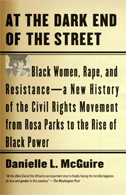At the Dark End of the Street: Black Women, Rape, and Resistance –
A New History of the Civil Rights Movement from Rosa Parks to
the Rise of Black Power

Author: Danielle L. McGuire
New York: Alfred A. Knopf, 2010. 324p.
Reviewer: Jennifer Jensen | January 2012
Danielle L. McGuire offers a startling new addition to the history of sexual aggression in At the Dark End of the Street: Black Women, Rape, and Resistance- A New History of the Civil Rights Movement from Rosa Parks to the Rise of Black Power. Through a chronological reexamination of the sexual violence suffered by black women and some men in the South prior to the civil rights movement, McGuire argues that rapes of black women by white men were largely ignored by mainstream society due to an underlying racial and economic hierarchy. As a result, rape systematically subjugated the black race and also challenged black respectability. Black people—women especially—were under continuous public scrutiny. Consequently, when black women were raped, the unwarranted violent sex acts allowed society to blame the victim for the assault, which was attributed to deficiencies of their race.
As part of the new perspective, McGuire inserts Rosa Parks as a foundational member of the NAACP before revisionist history acknowledged her participation. Black activists, including Parks, understood the effects of the rapes and sought to deconstruct the national practice of victimizing the victim. Civil rights activists recognized that many racial disparities were a direct result of white sexual domination. Therefore, change could only come about if black rape victims ceased to be culpable and white transgressors were held accountable, creating some small measure of racial equality in law and society.
McGuire focuses on the rapes of black women by white transgressors although black men were also subjected to the unwanted sexual advancements of white women. Many of her early sources are local and national newspapers and, in later years, audio and oral histories. McGuire foregrounds her narrative in the 1940s. This is significant because it challenges the traditional origins of civil rights awareness during the Montgomery Boycotts. McGuire’s method contrasts media coverage against extant state or court documents. The result reveals how newspapers reported the rape cases, in what context the victim was portrayed, and any public outrage incited because of the inertia of law enforcement. The state and court documents illustrate the lack of legal recourse black communities had when women were raped and, more importantly, the legal barriers built into the system to subjugate black people through sexual racialization.
In perhaps the most important case in this work, McGuire recounts the story of Recy Taylor, a woman abducted and later gang raped by six white men. The case is central to McGuire’s attempt to reframe the origins of the civil rights movement because it acts as a bridge between sexual violence investigations, Rosa Parks, and civil rights activism. McGuire argues that the early involvement of Parks not only brought greater attention to Recy Taylor’s rape, but it also implicated Rosa Parks much earlier as a political activist. After the Recy Taylor rape, McGuire traces the transformation of the sexual racializing of victims up to the public outcry surrounding the Joan Little case three decades later.
McGuire effectively captures the changing sentiments regarding the sexual racialization of black women because the rape cases expose the emotional struggles victims experienced, and the long road towards recognizing black respectability. There are, however, a few limitations to the author’s argument. Foremost, McGuire’s primary body of sources—newspapers—capture the sensationalism of injustice that swept the South. McGuire does not fully take into account the possible sensationalism inherent in the press, arising from the fact that newspaper stories relating to sex and scandal are often highly captivating. While there is no doubt the rape cases McGuire examines caused uproar, the newspapers might not be the most objective sources of information given their need to sell copies.
McGuire’s contribution, overall, is a compelling account of sexual aggression and civil rights activities in the South. Not only does McGuire raise questions about certain assumptions concerning black sexuality, but her efforts clearly emphasize that the civil rights movement was a long time in coming.
Jennifer Jensen is a graduate student in History at Rutgers University.


